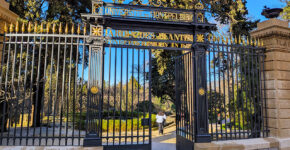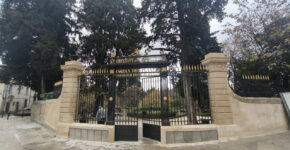Documentary Heritage and Archives
The University of Montpellier has a rich documentary heritage: printed works, manuscripts, archives, drawings, and engravings. Most of this heritage is preserved in university libraries.
Printed works
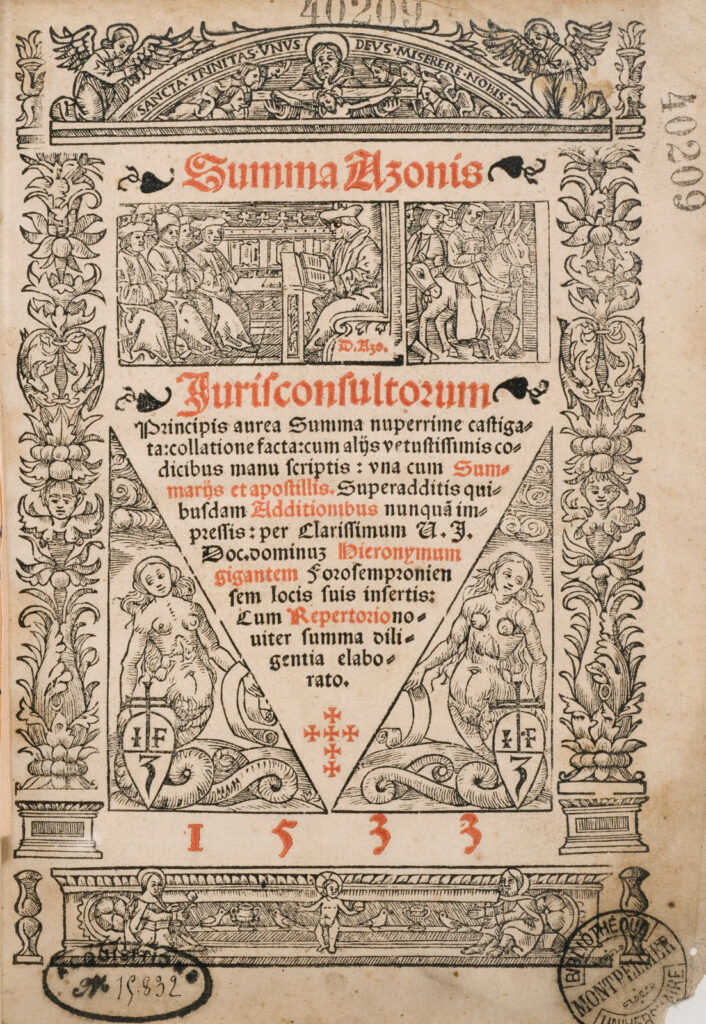
The print collections span from the dawn of printing to the present day. Rich and varied, they include 300 incunabula, hundreds of thousands of printed volumes from the 16th to the 19th century (books and periodicals), and specialized collections often donated. Encyclopedic knowledge is the watchword for these collections, not only because they are kept in libraries covering all the major disciplines, but also because they were generally conceived with a broad and generous vision of knowledge, as "libraries of the honest man" with the ambition of providing the richest possible access to knowledge.
BU History of the Faculty of Medicine
The History of Medicine Library holds 100,000 volumes printed before the 19th century, half of which relate to medicine and the other half to all aspects of knowledge: languages and literature, history, geography and travel, physical and natural sciences. You will also find old medical theses from Montpellier and Paris dating back to the 18th century.
Science Library
The core of the Science Library's heritage collections consists of the library of the former Faculty of Science, created in 1809. This collection was subsequently supplemented by prestigious bequests, such as those of Dunal (1857) and Girard, Jeanjean, and Gergonne. It is particularly rich in works on botany, zoology, mathematics, and astronomy. It also includes numerous works from the collection of Candolle, the famous Geneva botanist, as well as a unique collection of glass photographic plates dating from the late 19th and early 20th centuries.
BU Richter – Law, Political Science, Economics, Management
The Richter University Library holds more than 22,000 heritage documents dating from the 16th century to the mid-20th century, including 500 volumes on law and economics published before the end of the 18th century. It is notable for its special collections, which have been donated or bequeathed to the library, including the Antonelli, Barthélemy, and Geddes collections.
In the university library of law, economics, and management, you have access to the scientific and cultural heritage of the Montpellier Academy of Sciences and Letters. Heir to the Royal Society of Sciences created by Louis XIV in 1706, the Montpellier Academy of Sciences and Letters was founded under its current name in 1846. Covering science, literature, and medicine, it established a library in 1921, which now boasts 50,000 books, brochures, and periodicals from the 18th century to the present day, more than half of which are in foreign languages.
BU Pharmacy
The BU Pharmacie-PACES holds collections transferred in 1886 by the Montpellier School of Pharmacy, including donations from professors François-Joseph Rey (1758-1826) and François-Hugues Romeo Pouzin (1795-1860), as well as from the Montpellier School of Agriculture. This collection, comprising 5,000 documents, is both local and encyclopedic in nature. Botany and zoology account for a quarter of the volumes; significant space is given to pharmacy and its history, medicine and toxicology, as well as literature, philosophy, and geography.
All details about the various heritage collections can be found on the university library website.
Manuscripts
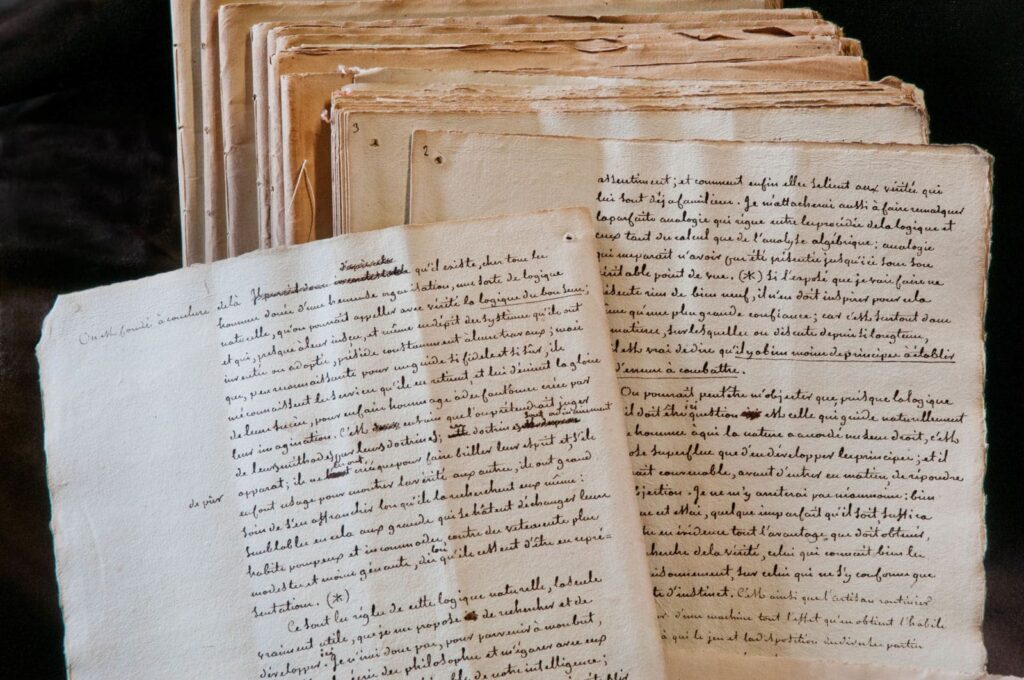
The most prestigious manuscripts are kept at the Historical Medical Library. This collection consists of 900 manuscripts, two-thirds of which date from the medieval period, covering all fields of knowledge.
For the Middle Ages, literature dominates: classical works, chivalric novels (Perceval by Chrétien de Troyes, three copies of Le Roman de la Rose), Italian poets such as Dante and Petrarch. Next come religious manuscripts: richly illustrated Bibles, Korans, theological works, lives of saints, breviaries, and missals. Essential medical texts are also present: Hippocrates and Galen, Avicenna, Albucasis (in two illuminated copies, one in the Gascon language that belonged to Gaston Phébus) and Arnaud de Villeneuve, or Gui de Chauliac and Roger de Parme with their surgical works. Music, including an 11th-century Tonaire and a magnificent 13th-century songbook, law, and philosophy are also represented.
Fifty-nine manuscripts date from the Carolingian period, including the oldest in the collection, a psalter from 780 that belonged to a member of Charlemagne's family. Others date from the 16th century—a superb portolan chart combining medieval cartography and great discoveries—the 17th century—correspondence from Christina of Sweden—or the 18th century—lectures by Montpellier physicians. The collection of such a wide variety of manuscripts within a medical school is unparalleled and constitutes the true treasure and uniqueness of the library.
Manuscript documents may also be found in specialized collections, such as the Gergonne collection at the Science Library.
Archives
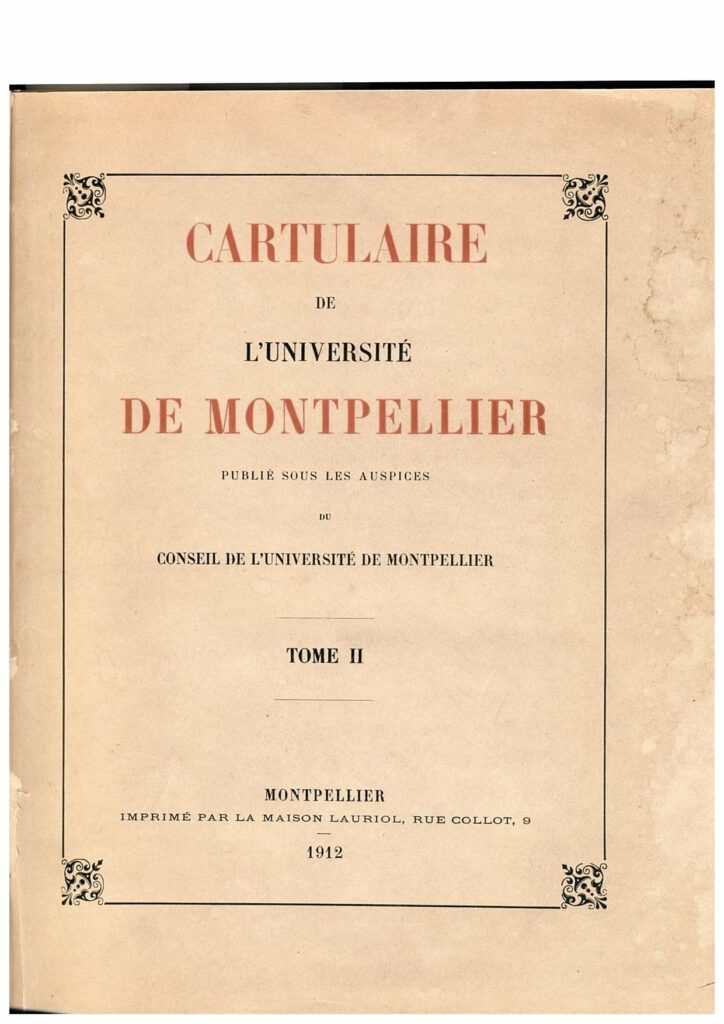
Archives, meanwhile, are a unique and indispensable source for any scientific research on the history, organization, and evolution of the institution, as well as on teaching and research.
The oldest administrative archives are now preserved, in part, in the Hérault departmental archives and, in part, in university libraries. The latter are legally responsible for storing theses and preserve some collections donated by professors.
For modern and contemporary archives, records are kept by each faculty and their processing is coordinated by the archives department. Several collections have been classified and inventoried, sometimes followed by transfer to the Hérault departmental archives. Other transfer projects are underway.
Depending on the period you are interested in, you can contact either of these services.
Faculty of Medicine Archives
The Faculty archives consist of two parts:
The historical collection (13th century–1808), which was catalogued by Joseph Calmette, archivist and paleographer, and published in 1912 in the second part of volume 2 of the Cartulaire de l’Université de Montpellier.
The modern and contemporary collection (19th–20th centuries) is currently being classified and cataloged.
To date, the following can be consulted:
- archives relating to the general administration of the Faculty of Medicine from 1794 to 1981
- archives relating to education from 1739 to 1982
- the collection of posters preserved by the Faculty of Medicine dating from 1862 to 1985
- as well as numerous registers, including enrollment registers, exam registration registers, exam results registers, and thesis defense registers from the 19th and 20th centuries.
The inventories are available for download in the "Online" section below. The inventory of the historical collection is available on the Foli@ digital library.
The Historical Archives of Medicine provides access to both collections by appointment only due to ongoing work in the historic building and in accordance with public archive access regulations. In addition, all readers are subject to the law on the reuse of public data.
Archives of the Faculty of Law, Economics, and Management
The original Liber Rectorum is kept by the university medical library under the reference number H595. This document contains statutes, regulations, concessions, and confirmations of privileges from 1326 to 1523. A copy of the Liber Rectorum dating from the 17th century is kept in the departmental archives in series D (archives prior to 1790).
Individual student files, teaching schedules, records of council and assembly deliberations, etc. have also been kept at the Hérault departmental archives since 1997, under the reference number 8ETP (University of Montpellier 1 – Teaching of law, medicine, pharmacy, management, dentistry, and sports science (1800-1985)).
The most recent archives are kept within the faculty.
Archives of the Faculty of Pharmacy
The 19th and 20th century records, kept within the faculty, are currently being transferred to the Hérault Departmental Archives.
As for the most recent archives, they are also kept within the faculty.
Faculty of Science Archives
The archives of the Faculty of Science were deposited in 2014 at the Hérault departmental archives. The most recent archives are kept within the faculty.
Since 2020, the Archives Department has been preserving the Francis Gleizes collection. For the record, Francis Gleizes (1938-2019) was a Professor specializing in planetary nebulae and affiliated with the Languedoc Research and Astrophysics Research Group (GRAAL). In 2024, this collection was classified and inventoried, and is available for download in the online section below.
It includes educational documents, scientific documents, gray literature, and personal papers. The Archives Department ensures the communication of this collection, in accordance with the rules of accessibility of public archives.
Online
Access part of the university's heritage resources online, free of charge, thanks to the digitization work carried out by the inter-university documentary cooperation service as part of the Foli@ online heritage library. The first digitized collections represent more than 90,000 items from medieval manuscripts and old prints (15th-19th centuries) on the history of medicine and pharmacy in Montpellier, the history of botany, and 18th-century optical views.
Archive inventories can be downloaded by clicking on the following links:
